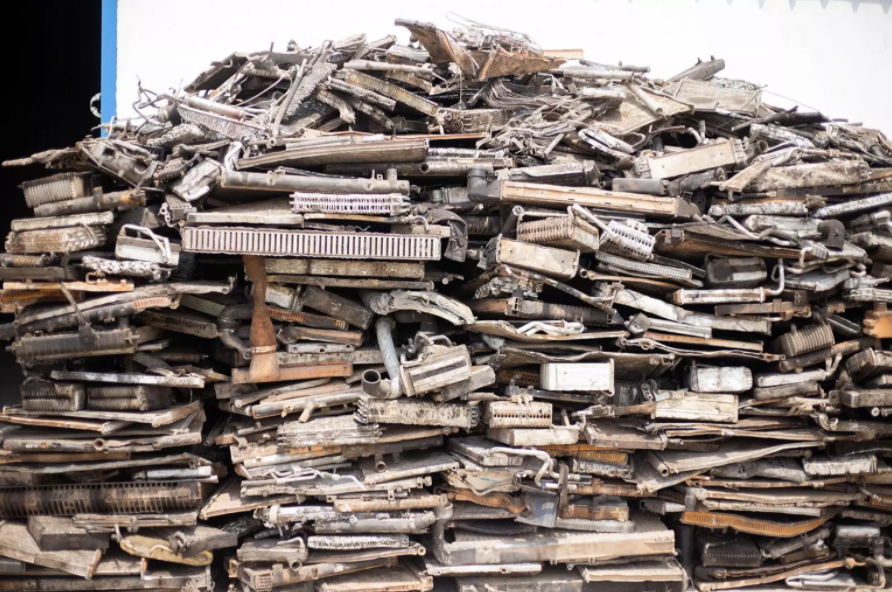February 12, 2021 — The ribbon on Romco’s Ghanaian recycling facility was officially cut by Romco Group CEO, Raymond Onovwigun, accompanied by Head of Physical Planning Dept., Ningo Prampram District Assembly, Aaron Aboagye, opening a brand new recycling facility that will grow Romco’s secondary metals capacity in the region.
Above: Aaron Aboagye (left), Head of Physical Planning Dept., Ningo Prampram District Assembly joins Raymond Onovwigun (right), CEO of Romco Group Ltd., to officially open the Romco Recycling Facility in Prampram, Ghana, 12/02/2021.
Romco Metals Ltd., Ghana is the second recycling facility under the Romco Group Ltd. banner, joining Romco Recycling Company Ltd., Nigeria’s operation, exemplifying Romco’s intensions of eco-expansion throughout Africa.
The Ghanaian facility, boasting two furnaces across two acres, incorporates new equipment alongside block-chain technology to produce secondary aluminium alloy ingots for a range of automotive, aeronautical, medical, food & beverage partners. The aluminium produced by Romco in Ghana will see recycled metals shipped all over the world to partners in Japan, China, South Korea, and more.
Above: A brand new furnace installed at Romco Metals Ltd., Ghana facility, capable of producing up to 800 metric tonnes of recycled aluminium a month (photo was taken during construction, before the official launch).
Importantly, achieving the Romco mission, ‘to reduce global dependence on mining by way of recycling our way to a sustainable future’, earned a boost of confidence with the development, as the new factory showcases the scalability and agility of Romco’s model. From planning to opening, Romco took just 12 months to complete construction, with the facility aiming to produce 800 metric tonnes of recycled aluminium a month. Orders are already being fulfilled.
Romco’s CEO, Raymond Onovwigun, stated in Romco’s latest Quarterly Report;
“One of the most important objectives we can achieve in the 21st century is reaching full recycling capacity for the materials we use; limiting the pollution and carbon emissions generated for our resources. The only way we can achieve that is to grow recycling capacity, especially in the regions that are underdeveloped, and increase supply consistency to give industry the confidence to purchase larger secondary quotas — and that’s exactly what we’ve achieved this quarter by building Romco Ghana.
Above: A pre-opening photo, taken last year, of the Romco Metals Ltd., Ghana facility under construction in Prampram.
Above: The first aluminium ingots processed in the furnaces at Romco Metals Ltd., Ghana, being prepared for shipment to China.
The facility will receive feedstock from metal traders, landfills, and intermediaries from all over the region, as far as Burkino Faso and Ivory Coast. The scale of waste sorting to produce the secondary aluminium represents a diversion of up to 73,000 cubic metres of waste (a premier league football pitch of waste over 10 metres high) from landfills per year. The direct environmental benefits of that reduction alone is enormous, reducing the greenhouse gasses and toxins that waste would cede into local communities and ecosystems via landfill.
The secondary production of aluminium from Romco Metals Ltd., Ghana will reduce emissions of up to 34,000 t/co2 compared to processing the materials via primary production (raw materials mining). That’s the equivalent of driving over 84 million miles in a standard car every year. As primary aluminium production is one of the most power-intensive activities in the world, accounting for more than 3% of total global power usage, the power savings for producing the secondary materials from Ghana is more than 118,000 mWh’s year, or the equivalent annual power produced by 18 wind turbines.
Above: A stack of radiators, in front of the new Romco Metals Ltd., Ghana facility, awaiting processing into aluminium alloy ingots.
Above: Among the first premium grade aluminium alloy ingots produced at Romco Metals Ltd., Ghana, ready for shipment to automotive, industrial, aeronautical, food and beverage companies including Nissan and Alcoa.
The opening is a landmark moment for the company, especially during a period of uncertainty in global markets due to COVID-19, and plans are already in place to see the facility upgraded as demand grows. Romco is determined as an organisation to increase recycling capacity for a meaningful reduction in the dependence on primary produced metals, assisting in the global fight to decarbonise our supply chains. This is but one more step in that direction and an exciting development for the environmental cause.












